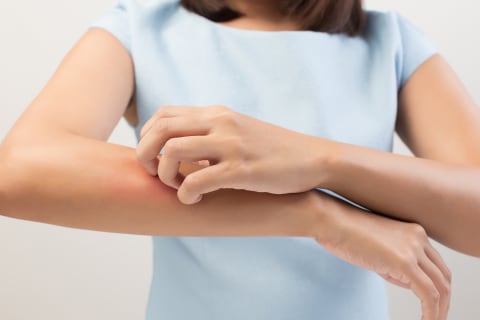Features:
- Compare to Flonase Allergy Relief Active Ingredient
- Fluticasone Propionate(Glucocorticoid) 50 mcg.
- Indoor/Outdoor Allergy Relief
- Non-Drowsy
About Aller-Flo®
Aller-Flo® is a nasal spray for relief of allergy symptoms. This product helps relieve a broad range of uncomfortable symptoms like congestion and itchy, watery eyes. These symptoms can be triggered by outdoor, indoor or animal allergens like pollen, mold, dust or pet dander.
- Compare to Flonase® Allergy Relief active ingredient
- 24 Hour Relief of: Itchy, Watery Eyes; Nasal Congestion; Runny Nose; Itchy Nose; Sneezing
- Full Prescription Strength
- Non-Drowsy

Understanding Allergies


When your body senses a substance that could possibly cause harm, it starts to fight. This is your immune system working to protect you. Some substances that don’t bother most people, such as pollens, pet dander, certain foods and insect stings, can trigger an allergic reaction in others.
A substance that triggers an allergy is called an allergen. Allergic reactions can happen soon after your body has contact with an allergen. This is your body’s defense system at work. Most allergic reactions are mild, but in rare cases, they can be life-threatening.
Hay fever and other upper respiratory allergies are often caused by weeds, grasses or other natural allergens in the air. When those tiny grains make it to your nose or throat, that can trigger an allergy. Your allergic reaction could be sneezing, or perhaps itchy eyes, or other uncomfortable symptoms. Avoiding your allergy triggers is the best way to control those symptoms. Notice when and where your allergies occur. This can help you figure out the cause.
Most people with allergies can be sensitive to more than one allergen, such as varieties in grass seeds or tree pollens. Seasonal allergies are most often caused by pollen or outdoor allergens. If you suffer from allergies all year round, indoor allergens may be the culprit.
Your health care provider can help you diagnose allergies based on a physical exam and your symptoms, but they also can use skin and blood tests to confirm.

Symptoms of Hay Fever or Upper Respiratory Allergies:
- Sneezing, often with a runny or clogged nose
- Coughing and postnasal drip
- Itching eyes, nose and throat
- Dark circles under the eyes
Fast Facts on Hay Fever:
- Number of adults diagnosed with hay fever: 19.2 million
- Percentage of adults diagnosed with hay fever: 7.7%
- Percentage of children under 18 years with reported hay fever: 7.2%
Allergy Tips


If you are allergic to a certain food or to a pet, total avoidance is the best strategy. Unfortunately, many allergens are not easy to eliminate. Dust mites, cockroaches, and mold are some common indoor allergens, and even if you keep your house immaculately clean, tiny particles of these substances are likely to remain. They can get into furniture, bedding, and soft toys. Here are some tips that can help you keep your house allergy-safe:
- Limit the number of carpets in your home. It is easier to remove allergens from smooth, hard floors such as tile or wood.
- Keep out of your basement. Most basements are damp, which encourages mold growth. A dehumidifier may help as well.
- Enclose your mattress in a vinyl cover to protect against dust mites.
- Remove all cloth drapes or curtains from your bedroom and replace with blinds.
- Wash bed linens and pillows in water hotter than 130° F to kill dust mites.
- Use an air purifier with a HEPA (high-efficiency particulate-arresting) filter to minimize the allergens floating in the air.
Drug Facts and Dosing Infomation


Directions
• read the Quick Start Guide for how to:
• prime the bottle
• use the spray
• clean the spray nozzle
• shake gently before each use
• use this product only once a day
• do not use more than directed
ADULTS AND CHILDREN 12 YEARS OF AGE AND OLDER
• Week 1 – use 2 sprays in each nostril once daily
• Week 2 through 6 months – use 1 or 2 sprays in each nostril once daily, as needed to treat your symptoms
• After 6 months of daily use – ask your doctor if you can keep using
CHILDREN 4 TO 11 YEARS OF AGE
• the growth rate of some children may be slower while using this product. Children should use for the shortest amount of time necessary to achieve symptom relief. Talk to your child’s doctor if your child needs to use the spray for longer than two months a year.
• an adult should supervise use
• use 1 spray in each nostril once daily
CHILDREN UNDER 4 YEARS OF AGE
• do not use